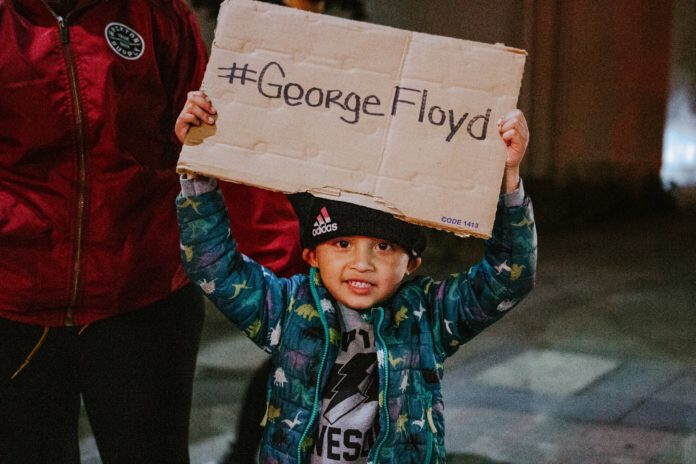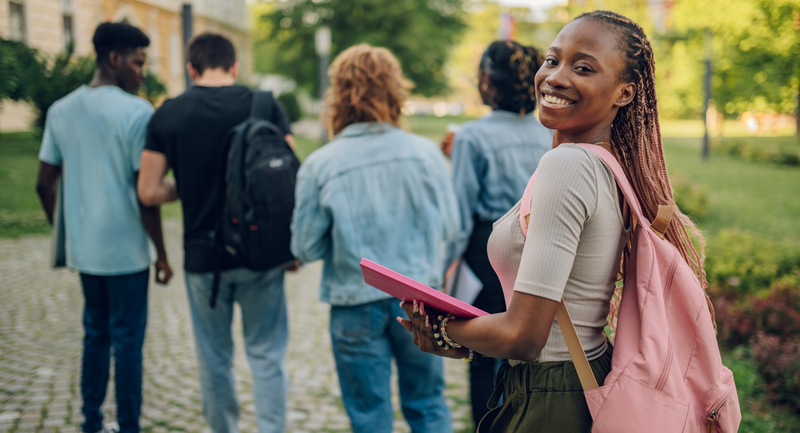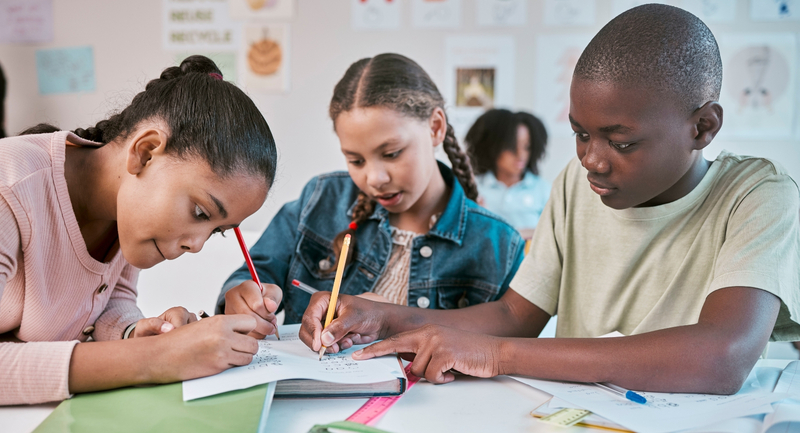During my school years, I learned about white scholars, white inventors, white ideas, and white theories. I did not read a book about a writer of color until I was in high school, and even then, it was not a part of the official curriculum. I was expected to find myself in narratives of enslaved Africans, of the three civil rights leaders I learned about each year, and of Black struggle. I did not see myself reflected in the clear faces with blonde hair and blue eyes that I read about or saw in magazines and on television. I became convinced that ingenuity could only live within whiteness.
I searched for stories about Black biracial children with immigrant mothers and absent fathers, about Black children who lived in cities and invented games because going outside was sometimes too dangerous. I searched for stories that represented me, that portrayed Black love, Black excellence, and Black joy. I searched for these stories until I could not search anymore.
Even as I was looking for myself in stories and lessons at school, I was watching news clips of Rodney King’s assault by police officers on the side of the road. I was listening with horror as newscasters told the slanted narrative of Amadou Diallo, who died with 41 New York-Police Department bullets in his body. And still today, violence against Black bodies continues, most recently with the murders of George Floyd, Breonna Taylor, and Ahmaud Arbery. Each unnecessary death fills me with worry and fear about whether I can ever be free of the trauma of witnessing the dismissiveness with which our country treats Black life.
And make no mistake, these impressions cause trauma. A 2018 study in the Lancet found that police killings of unarmed Black people have adverse effects on the mental health of Black people in the general population, but no effect on white people. These images also have adverse mental health effects on Black and Latinx youth, who have had to witness and experience racialized terror over and over again.
When Black students experience a world that devalues their humanity—including through curricular content that perpetuates narratives of inferiority and excludes their lives and full histories—and when they witness people who look like them being beaten or slain in the media, they are subject to the trauma of being made to feel worthless and unseen, of being made inhuman. Just imagine the damage done to our Black students’ psyches when, at school, they are made invisible in academic content and yet blaringly visible through oversurveillance and policing. And what do white children learn from these very same triggering images of Black death and the white-centered curricula that dominate many of our nation’s classrooms? They learn how to un-see and devalue Black lives. They learn how to feel nothing about Black suffering.
Educators Can’t Be Passive
Therefore, our trauma work must include not only addressing the toxic stress of racism, which we know contributes to adverse mental and physical health effects in people of color (Comas-Diaz & Hall, 2019; Williams, 1999), but also confronting the dangers of white privilege. Racial trauma work is just as necessary for white children because the hate and rage that feeds racism, which originates from the acceptance of white supremacy, inflict harm too. Without a deeper understanding of their racial biases and assumptions, white youth run the risk of putting Black lives at risk over their privileged safety (like the Central Park dog walker Amy Cooper) or becoming inured to basic civic injustices (like the politicians who allowed the water problems in Flint, Michigan, to happen and persist).
To ensure that all children, especially Black youth, have the privilege to live full lives, educators must confront racism and the resulting trauma from it. If not, we are not really doing equity work, and we are not really trauma-informed or trauma-sensitive. We are just saying we are. We are just maintaining the status quo. We are just making ourselves feel good. If we truly care about the future of our young people and our nation, we can no longer be passive about racial justice. We can no longer walk away, bask in our comfort, and ignore the way racism is killing us and destroying our nation.
Engaging in anti-racist work challenges the very institutions and systems that benefit from it, which means it comes with a host of risks. For me, it has resulted in a loss of material comfort and relationships, but I am willing to accept those risks for the promise of an anti-racist future. Anti-racist work has to be the hill you are willing to die on. That may sound drastic and morbid, but it is not a choice for Black folks—this dying for defending our humanity. I want to live in a world where Black people do not have to experience being punished for the color of our skin or being forced to conform to the ways of the white powerful. I’ve learned from experience that mitigating racial trauma requires naming racism, whiteness, and white supremacy and their impacts on people’s lives. We have to identify the problem we are trying to solve to begin working towards solutions. For too long, our nation has chosen not to confront our ugly past or the continuing dehumanization of Black people—a negation of reality that is carried out in our schools. Our wounds will never heal if we do not identify and tend to them.
Whose Realities?
Teaching to prevent and mitigate racial trauma requires, first and foremost, that educators commit to racial justice, to being anti-racists. I have grown impatient with the many teachers I support who tell me how scared they are to talk about race, how they do not know where to begin, how they are paralyzed by discomfort and wanting to get it right. Racial justice is urgent, and though I understand this fear and desire, we have to stop prioritizing white tears over Black lives. We cannot let our emotions paralyze us from engaging in anti-racist teaching. We have to start somewhere. In a society that is founded on whiteness, the chances are high that we will make mistakes on our anti-racist journeys. We may say the wrong thing. We may offend someone. What matters most, however, is that we learn from our missteps and bounce back instead of wallowing in our self-pity. When we educate for racial justice, we must engage in self-work and understand our power and privilege so that we do not harm our students through an inadvertent abuse of power. If we do nothing, Black people will continue to experience the injustices we have always faced.
As we engage in racially just pedagogy, it is important that we do not retraumatize students by showing pictures or videos of police- or vigilante-related violence against Black people. Instead, focus on teaching students how to identify and analyze racial bias in media and provide ways for them to reach out to media outlets with their findings to advocate for fuller stories. Empower students to disrupt single narratives of Blackness. Most important, center students’ realities in the content you teach. This means affirming and valuing students and their communities in our teaching and putting social justice, equity, liberty, healing, and humanity at the core of our instruction, curriculum, and school policies.
In this regard, I encourage educators to interrogate, with an antiracist lens, the curriculum, learning experiences, and school policies to which our Black students are subject. Ask whose realities are reflected in what they are learning. Whose are not? Who will have the privilege of feeling valued and belonging? Who will not? It is our responsibility to mitigate the trauma of erasure that so many Black students have experienced just as I did. Go above and beyond what textbooks tell us is our history, introduce diverse voices and experiences through literature and mentors, and expose students to better media resources so that all students see and believe in Black heroism, Black ingenuity, and Black success.
Lastly, we must create opportunities for students to share their feelings freely in courageous and safe spaces centered on healing. It is crucial to provide young people with resources and activities for healing and engaging in self-care and to share accessible therapeutic and counseling supports.
Antiracist pedagogy involves deep, courageous work. It is important to understand that we cannot trauma-inform away racism. We cannot tweet away racism. We cannot read away racism. We cannot intervention away racism. We cannot breathe away racism. Educators, and especially white teachers, have to roll up their sleeves, look within themselves, sit with discomfort, reflect on what they can do better, and then live and teach with racial justice as their guiding principle. This work starts with us, but it cannot end with us. It must include dismantling old oppressive systems and structures and building anew.





